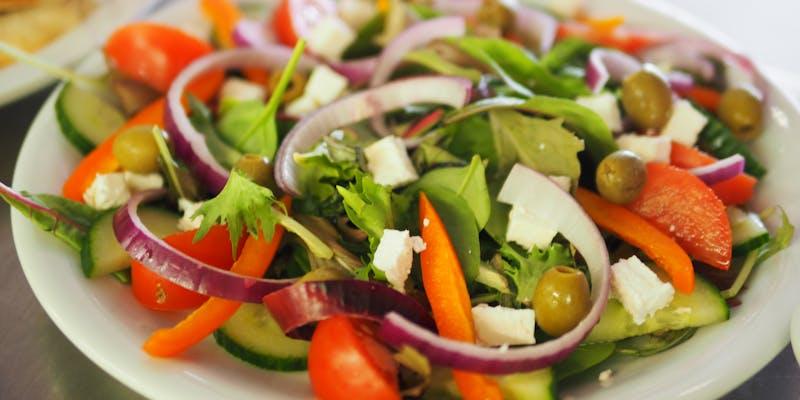Why do salads cause bloating? Tips to enjoy them without discomfort
Aug 28, 2024 By Isabella Moss
Many humans believe that there is nothing healthier than a sparkling, colorful salad with their meal. We've always been advised to eat green vegetables and salads, as they contain gut-healthful minerals, fiber, nutrients, and enzymes. But what we dont pay attention to is that salad also affects people differently. Raw salad may cause digestion issues and increase your complaints of feeling bloated after every meal and even stomach pain. Stop salad bloat by eating an anti-bloat diet if you are a victim of this. Though salads are healthy, knowing why you get bloated after eating one might help you fix it.
Causes of Bloating After Eating Salads

High Fiber
Raw salads include fiber, which aids digestion. Fiber bulks stool and promotes regularity. Sudden increases in fiber intake can induce bloating and gas in some people. Gas is produced when gut bacteria digest fiber. High-fiber salads can be the reason behind you feeling bloated after every meal. To fix it, increase fiber intake gradually and stay hydrated.
Complex Carbs
Broccoli, cauliflower, and Brussels sprouts provide complicated carbs to salads. These vegetables include raffinose, an indigestible sugar. Gut microorganisms ferment raffinose within the large intestine, which can cause gas and bloating.
Insufficient Chewing
Effective digestion requires proper chewing and an anti-bloat diet. Eating raw salads rapidly or without chewing causes bigger food particles to reach the digestive tract and require more work to break down. Gut bacteria can ferment, causing bloating and gas. Chewing salads completely aids digestion and reduces bloating.
Salad Toppings and Dressings
Salads are low in calories, but sauces and toppings add fat and calories to your anti-bloat diet. In excessive quantities, creamy dressings, cheese, croutons, and nuts can cause bloating. These dressings contain excessive amounts of sugar that can also cause other health problems.
Food Allergies or Sensitivities
Food sensitivities and allergic reactions can cause bloating and other digestive problems after ingesting specific salad elements. Nuts, dairy, gluten, and a few fruits and greens are not unusual salad allergic reactions. A meal diary and elimination of trigger foods can help discover and manage food sensitivities, decreasing bloating and other discomforts.
Eating Large Portions
Overeating any food can result in bloating and discomfort. Healthy raw salads can be satisfying due to their high fiber content, but overeating them can cause bloating and gas. Limiting portions and eating until you're full can minimize salad bloating.
How to Avoid Salad-related Gas and Bloating?

There are several strategies to manage salad bloat, including:
Drink More Water
Digestive efficiency requires appropriate water. Drinking enough water regulates our digestive juices, which help damage our meals. To increase digestion, soluble fiber in grains, nuts, and seeds, as well as some results and vegetables, draws water. Without enough water, your digestive tract can slow down, causing bloating, fuel, and pain.
However, drinking too much water during meals and eating non-bloating salads might dilute digestive secretions and reduce their efficacy. Instead, drink small amounts of water with meals and more after that to keep your digestive system hydrated and healthy. This balanced technique aids digestion and prevents bloating and discomfort.
Thoroughly Chew Food
Good digestion and health require thorough chewing of an anti-bloat diet. On hectic days, we speed through meals, yet chewing your food properly can make a big impact. Chewing breaks food into tiny pieces your digestive system can process. The digestion process begins in the mouth when saliva enzymes break down carbs.
When you don't chew well, bigger particles enter your gut and make digestion harder. Bloating, gas, and pain might result. Chewing until food is practically liquid improves nutrient absorption and reduces digestive strainpractice slow eating and chewing to enhance digestion and health.
Alter Your Diet
Slower, more relaxed meals help improve digestion and health. Sitting and feeling peaceful while eating prepares your body for digestion. Stress and diversions can impair digestion, causing bloating and indigestion. Eating calmly helps your body digest meals. This eating change optimizes digestion.
By enjoying your meals with non-bloating salads and without multitasking or rushing, you improve digestion and nutritional absorption. A quiet dining atmosphere improves digestion and makes eating more enjoyable and focused. Sitting down for meals and managing stress improves digestion and well-being.
Feed Your Body Good Bacteria
Many helpful bacteria in our gut break down fiber and aid digestion. Consuming healthy probiotics with non-bloating salads can improve this process and reduce salad bloating. Kombucha, curd, and kimchi are great probiotic foods. Kombucha and curd include living cultures that support intestinal flora, and probiotic-rich kimchi helps gut health.
Take Short Walk
A short walk or light stretching after a salad is recommended.A modest post-meal activity aids digestion and relieves gas and bloating. This gentle workout moves meals through your digestive tract and relaxes your belly muscle tissue, enhancing digestion. A short walk also helps digestion, reduces stress, and boosts mood. Adding this habit to your regimen can improve digestion and reduce the complaints of feeling bloated after every meal.
Loosening stomach muscles with little exercise helps food flow through the digestive tract, releasing gas and reducing bloating. A short walk or stretches also improve digestion and gut health. This method improves digestion, nutrient absorption, and post-meal comfort. Avoid strenuous workouts after eating since they divert blood flow from the digestive tract and impair digestion. Choose moderate activities that assist digestion and your body's natural processes to avoid feeling bloated after every meal.
Give Your Abdominal A Massage
If diet changes and adding non-bloating salads don't help bloat, massage your abdomen. This may allow food to flow through your intestines and reduce pain. Do it like:
- Start on your right side around your pelvis and rub upward in a circle to your ribcage.
- Reach your upper left side and drop to your left hip.
- Move toward your belly button once.
- Repeat clockwise for up to 10 minutes.
- Rotating counterclockwise may worsen your problem.








